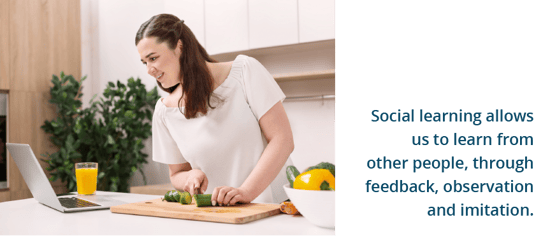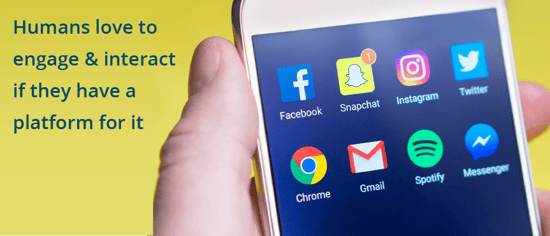If you’ve ever explored the OpenLearning site, you will have seen the phrase ‘social learning’ being used a lot - that’s because social learning experiences are what the platform was built and designed for.
OpenLearning provides the tools for educators and course creators to build a thriving online community and not just an online course.
So what do we mean by social learning? This blog post will take you through what social learning is all about and why OpenLearning loves to promote it.
Social learning is the idea that we can learn from others, by observing and imitating them.
Think about all those cooking shows on TV; how many of you have learned how to cook a new ingredient by watching a cooking show?
I know, you should add salt and oil when cooking pasta, cook it al dente, save some of that cooking water and finish it off in the sauce - thanks Masterchef!
OpenLearning makes it easy for students to share their work and see others' using our share-widgets and in-built galleries.
Watching chefs get feedback is another important part of the learning process.
If a chef gets complimented for their technique, then we know that technique is something worth trying. But if their dish gets a bad critique, then we know we won’t be serving that to dinner guests any time soon. This method of learning is known as vicarious reinforcement.
In this way, social learning also enables us to learn what is good and what is bad.
This is why OpenLearning enables and encourages commenting and liking, so students can see each others' feedback and learn from them.

Now, imagine having those same chefs get together regularly. Some might be more experienced than others, or are experts in one area of cooking but lack the knowledge in another area. Together, however, they have a vast collection of knowledge, skills and experience.
The diversity of skills and experience means that learners have examples to model from and members of the group can support each other to bridge any learning gaps.
This is known as a community of practice, a group of people who share the same interests and want to improve their skills or knowledge by interacting regularly.
You might have been involved in one yourself, for example at your work or with a social group. How much have you learned by engaging with others as opposed to going about your job or passion alone?
Having a community to engage with leads to greater intrinsic motivation and higher participation levels.
Think about all the memes, tweets and videos that young (and older) people share on social media. They don’t have to do it but they do.
They do it because there is an audience who will appreciate their work, the work means something to them, and it is relatively easy to do.
This content creation and sharing phenomenon is known as participatory culture and it exists when there is a platform for it. This is why OpenLearning incorporates plenty of social media elements to encourage participation in many ways.

Social learning isn’t just about mastering content - it also supports the development of valuable soft skills.
Collaboration is quickly becoming a key skill that employers look for as the ability to work with other people is important for productivity, creativity and healthy workplace relationships.
OpenLearning Course creators can support the development of collaboration skills by enabling groupwork and group submissions. When students have to work together to complete a task or understand a topic, they can learn how to interact thoughtfully and meaningfully.
Deep learning occurs when students are active in the learning process.
Social learning provides many opportunities for students to engage in active learning. They include being able to communicate ideas to other people, think critically, connect ideas and negotiate their understanding within a group.
In this way, students are actively building their knowledge and learning to collaborate effectively, which will support them towards lifelong learning. This is why the OpenLearning platform encourages community-building and social learning experiences.
So there you have it; 6 reasons why OpenLearning is all about social learning.
Want to start creating your online community? Head to OpenLearning.com and start today!
